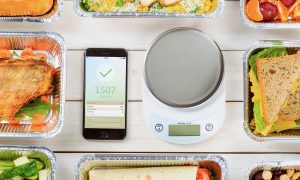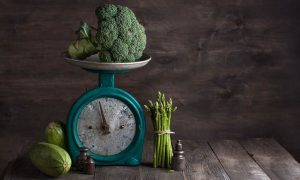Should I Calculate My Macros?

|
|
For many of us, simply eating cleanly and healthily is difficult enough, without having to worry about things such as counting calories or paying attention to the amounts of the foods and drinks that we are consuming on a daily basis. Taking things one step further however, a great deal of people nowadays, are counting and calculating their macronutrients, also known as macros, and are seeing some pretty impressive results in the process. A macronutrient is basically used to describe the amount of calories provided to the body, via either: fats, proteins, or carbohydrates. Losing body fat by itself is difficult enough, yet when you factor in the fact that people also more often than not, are looking to increase, or maintain, their lean muscle mass, it’s no wonder why calculating macros is proving to be such a difficult thing to do for individuals all over the globe. One of the biggest issues that people encounter when trying to get in shape, is actually integrating the perfect diet and nutritional plan, into their day to day lives. Think about it; when most people try to lose weight, they follow fad diets that only last a few weeks. Sure, they lose the weight at first, and heck, if they’re really strict they even manage to keep the weight off, but the biggest problem is the fact that these diets are simply not sustainable. Counting and calculating your macros however, actually is sustainable, especially as you learn how to do it on a regular basis.
What is macro calculating?

Put very simply, macro calculating is where you calculate the total amount of calories that you have consumed each day, and work out how many calories have come from protein, how many have come from fat, and how many have come from carbohydrates. The great thing about calculating your macros however, is that you can calculate them based upon your own specific goals, lifestyles, and your current physique. For example, somebody trying to burn fat and slim down, is going to need less fat and less protein than somebody trying to increase their muscle mass and bulk up. Bodybuilders and health and fitness experts have been calculating their macros for years, and certainly have no issues with weighing and measuring the quantities of the foods that they plan on consuming before they actually consume them. For anybody else looking to calculate their macros however, you will need to get yourself a set of reliable and relatively accurate scales.
Why should you calculate your macros?
When it comes to calculating your macros, many people choose to use this method to help them reach their health and fitness goals, as opposed to simply counting calories. Sure, counting calories is a great way of helping to watch your weight, but it only tells you half of the story. You see, on paper, you may have consumed 2000 calories on one day, just as you were aiming to do. However, if those calories came from primarily fat, and carbohydrates, that lack of protein could lead to a loss of muscle mass and definition. Calculating macros ensures that you get the correct combination of macronutrients inside your body on a daily basis.
Reasons why you should calculate your macros
There are a number of benefits associated with macro tracking, but the thing to remember is that it isn’t for everybody, so you will need to consider a few things before you go any further. Here we’ll begin by taking a look at a few reasons why you should calculate your macros:

You want to get shredded – You’ve seen the fitness models and athletes on the TV and in the magazines, all of whom will have been absolutely shredded with barely an ounce of body fat upon their bodies, yet when you look in the mirror, despite being in decent shape, compared to them, your physique just doesn’t cut it. If this applies to you, and you simply cannot get shredded and as ripped as you would like, no matter how much cardio you do, and how clean your diet is, now would be the ideal time to start calculating your macros. If you’re lean, but want to get ripped, learn how to calculate your macros and find the ideal ratio, because you will see fantastic results once you learn what you’re doing. Some people’s weight, and indeed their physiques, can fluctuate and change dramatically, not by how many calories they consume, but also by which macros they consume. For example, some people respond poorly to carbohydrates, in which too many carbs can make them look bloated and watery. By calculating your macros, you will be able to work out the precise amount of calories from carbs required, so that you function correctly, without looking bloated and watery. You see, some people think that, just having slightly more than is recommended for them, won’t hurt their goals, because let’s face it, how much damage can 9 ounces of chicken breast do the physique, instead of 8. Well, as it happens, that extra ounce can do quite a lot, because an ounce extra of protein here, and a couple of grams extra of fat and carbs there, can increase your calorie consumption pretty drastically, without you even realising. By calculating everything down to a tee, there is no guess work required as you know exactly what you’re consuming and what is required to melt away that last pound or two of fat, allowing you to display a chiselled midsection hiding underneath.
You aren’t sure how much protein you need – In order for you to build or maintain lean muscle mass, experts recommend between one and two grams of protein per pound of bodyweight, every single day. If you’re already over 200 pounds in weight, you will probably be aiming for 300 grams of protein per day, which is a lot. Some people will consume two fairly large portions of protein per day, as well as a high protein snack, and will be convinced that they are getting enough, when in reality, they may only have consumed around 120 – 140 grams per day, putting them way below the amount required to stimulate new muscle growth. By calculating your protein macros, you know how much protein is contained in each meal/food source, as well as how much you’ve consumed, and how much you have left before you hit your target. Ideally you should be looking for around 30g of protein for each meal, and by calculating your macros, you know for a fact that that is what you will be getting, instead of just guessing.

You’ve hit a natural plateau – We all have times when, no matter how hard we’re training, and no matter how clean our diets seem to be, we simply can’t seem to make any progress and we simply don’t find ourselves getting anywhere fast. If you’ve reached a natural plateau, whether it be regarding your fat loss, your muscle growth, your strength, your energy, or anything else, you may wish to start calculating your macros. By doing this, you are able to create the ultimate diet and nutritional plan that is designed to get the absolute best out of you and your training. The reason why you may have felt tired and sluggish before training could have been down to too many pre-workout carbs. The reason you weren’t gaining muscle could have been a lack of amino acid-rich protein foods. Whatever your issues, by taking a professional, almost scientific approach to your diet, you will be able to get the absolute best out of yourself, each and every single day, meaning that you will quickly overcome even the steepest and toughest of plateaus.
Reasons why macro calculating may not be for you
Now that we’ve looked at a few examples of why macro calculating could be so beneficial, it’s now time to look at a few instances in which you may not wish to give it a try for yourself:
You don’t want the mental hassle – If you have an obsessive compulsive personality, it can be easy to find yourself getting obsessed with macro calculating, in which you will find yourself driving yourself crazy as you obsess over every single item that enters your mouth. There won’t always be times when we have weighing scales and handy apps on hand to weigh our food, and if the thought of not being able to weight and calculate every single item you consume, is making you anxious, you may wish to save yourself the mental hassle.
You already know exactly what you’re doing – In the early stages, of course you will meticulously weigh and measure every food and beverage that you consume, but like all things, the more you do it, the easier it becomes. Whereas beforehand, you may not have had a clue what 8 ounces of chicken looked and felt like, after a while, you will know exactly how much 8 ounces of chicken is, and anything else for that matter, without putting it anywhere near a set of scales.














